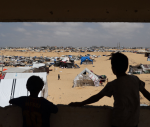You are here
Jordanians deem bad economy the major challenge — poll
By JT - Nov 01,2017 - Last updated at Nov 01,2017
AMMAN — Economic problems topped challenges that face the Kingdom, according to 81 per cent of the national sample that responded to a recent opinion poll, whose findings were announced on Wednesday.
Conducted by the University of Jordan’s Centre for Strategic Studies (CSS) one year after the formation of Prime Minister Hani Mulki’s second government, economic problems were regarded as the top concern of 84 per cent of opinion leaders.
The survey divides respondents into two categories: grassroots — or the “national sample” — and opinion leaders, according to CSS website.
In the poll, the national sample consisted of 1,824 individuals above the age of 18 with an equal representation of men and women, who were chosen from 162 locations nationwide, while the opinion leaders sample included a random group of 700 people categorised into seven groups of 100 member each, according to the centre.
Conducted between October 15 and 24, the poll involved a total of 52 field researchers, with a margin of error of 2.5 per cent.
Forty-one per cent of the national sample believed that things were going in the right direction in Jordan, registering a 7 per cent drop from April’s survey.
On the other hand, 34 per cent of opinion leaders said that things were on the right track, going down by 21 per cent from the previous poll, which was carried out 200 days after the formation of Mulki's government.
In the most recent survey, more than one third of the national sample said they believed that the government was able to shoulder its responsibilities in the "past phase" (Cabinet with 35 per cent, premier alone 34 per cent and the ministerial team excluding the premier with 34 per cent), marking a 9 per cent drop from April poll.
Opinion leaders gave the government a better evaluation for shouldering its responsibilities (Cabinet with 39 per cent, premier alone 41 per cent and the ministerial team excluding the premier 40 per cent), yet the assessment dropped by more than 8 per cent compared with April poll, according to the CSS.
The national sample’s reasons for the government’s perceived “inability” to shoulder responsibilities were mainly attributed to economic conditions, high unemployment rates (38 per cent), lack of achievements and reforms (23 per cent), the government’s failure in addressing corruption (14 per cent).
On the other side, the opinion leaders’ assessment was based on weak performance of the premier and the ministerial team (26 per cent), lack of achievements and reforms (24 per cent) and weak planning and management (16 per cent), among others.
Poll results showed a slight drop in the assessment of national sample and opinion leaders of the government’s ability to address main issues listed in the Royal Letter of Designation.
On this issue, findings showed a decline in the national sample’s evaluation from 48 per cent in April to 45 per cent in this poll, while opinion leaders’ assessment dropped from 54 to 46 per cent.
As for the national sample’s assessment to the economic conditions of their families, 57 per cent of them said that their current conditions are worse than a year ago, 11 per cent said their conditions are better than a year ago, while 32 per cent said that their conditions were still the same.
As for personal economic outlook in the next 12 months, 44 per cent of the grassroots sample said their status would be worse than now, 26 per cent expected them to improve and 25 per cent said that their conditions would not change.
Regarding the Kingdom’s current economic conditions, compared to the past 12 months, 70 per cent of opinion leaders said that current conditions are worse than a year ago, 25 per cent said they are the same and only 5 per cent said that Jordan’s economic status improved.
As for expectations on the country’s economic conditions, 19 per cent of opinion leaders expressed their optimism of having better conditions, while 49 per cent said that the economic situation would become worse.
Twenty-eight of the national sample said that electricity is the biggest burden on their families’ budgets, followed by food and beverages with 24 per cent, homes (13 per cent), higher education (11 per cent) and health (10 per cent).
On their responses to economic challenges, 34 per cent of the national sample said they chose to reduce expenditure, 27 per cent delayed buying expensive goods and services, while 20 per cent had to borrow to buy needs and face high costs of living.
Related Articles
AMMAN — Sixty-nine per cent of Jordanians see their current economic conditions as much worse than last year, according to a recent opinion
AMMAN – Fifty per cent of mainstream Jordanians believe that the situation in the country is moving in the “wrong” direction, compared with
Jordanians’ satisfaction with the performance of the incumbent government of Abdullah Ensour witnessed an increase four months since the last comprehensive poll by the University of Jordan’s Centre for Strategic Studies (CSS).















